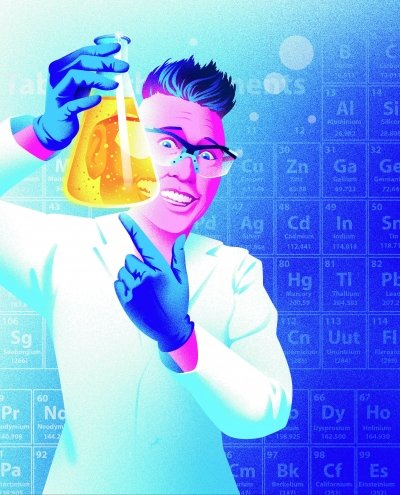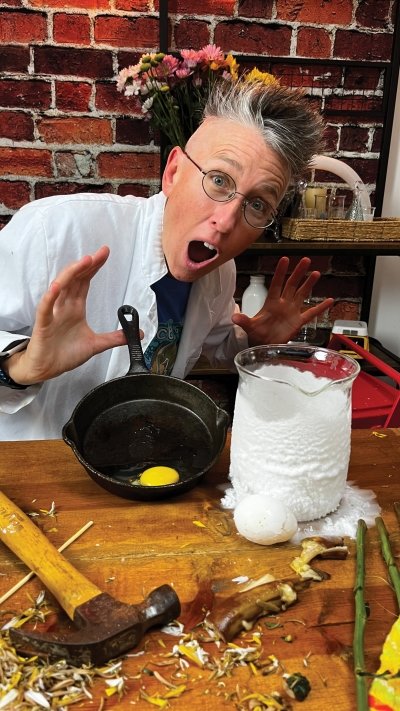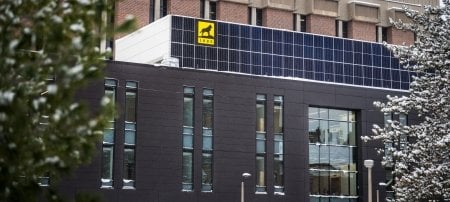Chemistry alumna Kim Hilton '91 is bringing science education to new heights by embracing dynamic changes in technology, culture, and the learning landscape.
Hilton, known on social media as Chemical Kim, utilizes short-form video to demonstrate science, technology, engineering, and mathematics concepts to more than 1.5 million followers on TikTok and other social media channels. Her content ranges from features on innovative eco-friendly products to engaging lessons explaining scientific concepts like water density.
In addition to her role as a STEM education influencer, Hilton teaches chemistry at Florida SouthWestern State College. As technology continues to reshape the educational landscape, Hilton recognizes that she must adapt to the evolving learning preferences of her students—both in the classroom and on social media.
Can you share some examples of meaningful interactions with your online community?
KH. The online journey has been incredible, offering two particularly memorable moments. One instance that stands out was when I shared a video on creating starch-based plastic, inspired by an eco-innovator from Indonesia. It sparked a beautiful exchange with many individuals from that part of the world, who shared their eco-friendly initiatives. Witnessing my US followers' surprise and enthusiasm at seeing such global innovation for a cleaner environment was a real eye-opener.
The other fantastic part has been forging connections with incredible STEM educators across the globe. I've been featured on nationally syndicated television shows, hosted a science livestream with Benny the Bull, and built friendships with remarkable STEM influencers like Astro.Alexandra, lab_shenanigans, DrDre4000, and many others. These connections have become more than just professional collaborations. They've grown into lasting friendships, fostering ongoing inspiration and learning from each other.
How has your career evolved over the years?
KH. My career as a professor has been all about adapting and evolving alongside my students' changing learning styles. I've never stuck to just one teaching method; instead, I've always been quick to analyze and adapt to what works best for them. For instance, back when mobile technology was just taking off, I was among the first to integrate the iPad into my teaching, creating a wireless lecture environment and crafting a mobile-friendly course while others stuck to traditional methods.
In my science outreach, I've also embraced change—from hosting a 30-minute "Chemical Kim Science Show" on a community public access television station to creating shorter, snappier five-minute segments on the ABC affiliate WZZM 13 television station, to diving into quick, engaging one-minute vertical videos on TikTok, Instagram Reels, and YouTube Shorts.
Whether in a classroom or on social media, my goal is to make chemistry relatable to everyday life, linking the science to common materials or behaviors. People genuinely want to learn, but the traditional way of teaching chemistry often makes it seem exclusive. I aim to break that barrier and make chemistry accessible and engaging for everyone.
What are some of your proudest moments and accomplishments?
KH. My proudest moments come from being unapologetically me. Being authentic is crucial in the STEM space. For years, I felt pressured to fit into a certain mold in the classroom and in the media. But when I started teaching science as my authentic self, that's when I truly found success. Sure, not everyone might resonate with my unique look—a nerdy woman with short hair and a shaved head—but I firmly believe that being true to yourself is key to achieving your best. Seeing the impact of my authenticity not just in my career but in the lives of my students and my own children has been an incredibly rewarding and proud journey for me.
The thing is, when you put yourself out there, you'll make mistakes. And yes, brace yourself, because people might come at you pretty hard. We live in a world where some see science as either perfect or something not worth believing in. Many have lost sight of the essence of science, which is about disproving and refining through the scientific method.
How did your time at Tech help shape the person you are today?
KH. Michigan Tech was the cornerstone that shaped the person I am today. The education, the professors, the friendships, and the experiences I had while there were pivotal in making me the successful chemistry teacher and science education influencer I am now. My time at Michigan Tech was one of the most challenging periods in my life. I wasn't the typical college student, spending more time studying and working rather than partying. Financial concerns loomed large, and I knew that a Michigan Tech education was my ticket to a better life.
It was during those times at Tech that I transformed into the person I am today, someone who's driven by hard work, self-reliance, and a "never give up" attitude. I learned that with sheer determination and an unyielding "can do" spirit, I could achieve anything. This mindset paved the way for my journey to where I am now. I'm so grateful to have a career I absolutely love, the opportunity to share science education with a global audience through social media, and a supportive wife and four wonderfully happy and successful adult children.
You came to Tech intending to be a chemist, right? What inspired you to pursue science education?
KH. Yeah, my chemistry obsession started early, thanks to a childhood spent exploring and asking a gazillion questions. High school chemistry blew my mind and steered me toward studying it in college. I graduated from Tech in '91 with a chemistry degree—a BS, adding secondary education certification with a mathematics minor.
Deciding to teach was like facing my biggest fear head-on. I'm a pretty shy person and wasn't good at speaking in front of people. At the start, it was tough. I even got some not-so-nice feedback from a supervisor who suggested I stick to the lab, not teaching. But I was determined to prove them wrong.
I took extra teaching courses and volunteered in community youth organizations like the Girl Scouts, and after a short time working as an environmental chemist, I gave teaching another shot. I still get nervous speaking in public, but I remember what my mom said: "Nerves mean you care."
How many times do you have to run your experiments to get them camera-ready? Any epic fails or funny things that have happened?
KH. Ah, the magic of those one-minute videos! The truth is, they don't just magically appear in a snap. It's more like a blooper-reel marathon.
Chemical Kim on Social Media
My experiments take several days, especially if it's a new lesson designed for everyone to try at home. Let's just say I've had my fair share of "oops" situations—like breaking Pyrex dishes, creating wax havoc, and causing eruptive gas disasters due to missing a crucial ingredient. (Note to self: don't forget the dish soap for home gas collecting experiments.)
I've spilled, broken, and forgotten things—but hey, it's all part of the scientific process, right? Sharing these fails is important because science is mostly about trial and error.
What are some of your future goals and aspirations?
KH. My goal is to showcase the incredible work of STEM educators across the globe, emphasizing the importance of collaboration, diversity, and inclusion in science and education. I strongly believe that our growth as individuals and the advancement of science significantly benefit from a collective approach. By bringing together diverse perspectives, cultures, and experiences, we foster an environment that's not just inclusive, but thrives on the exchange of ideas and insights. Working together, we can make immense strides in scientific innovation and build a stronger, more unified global community.
Michigan Technological University is an R1 public research university founded in 1885 in Houghton, and is home to nearly 7,500 students from more than 60 countries around the world. Consistently ranked among the best universities in the country for return on investment, Michigan's flagship technological university offers more than 120 undergraduate and graduate degree programs in science and technology, engineering, computing, forestry, business, health professions, humanities, mathematics, social sciences, and the arts. The rural campus is situated just miles from Lake Superior in Michigan's Upper Peninsula, offering year-round opportunities for outdoor adventure.






